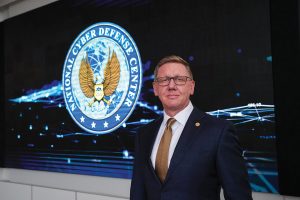The anchor of Marshall University’s Innovation District, the Institute for Cyber Security (ICS), will prepare students for the future of cybersecurity while simultaneously building a government, academic and industry ecosystem.
At 7,800 square feet, the state-of-the-art ICS will include space for government entities, a convention center to fit hundreds, a security operations center and 13 labs for a variety of hands-on experiences – including industrial control systems, the Internet of Things, open-source intelligence and more.
“Cybersecurity is an international priority,” said Marshall University President Brad Smith. “The ICS will enable Marshall, Huntington and West Virginia to develop the next generation of cyber professionals by providing the cutting-edge research and techniques to keep up with fast-evolving technology like artificial intelligence.” 
Earning federal support from the Department of Defense (DoD), the Joint Force Headquarters-Department of Defense Information Network (JFHQ-DODIN) and the National Cyber Defense Center (NCDC), formerly known as the National Center of Excellence for Cyber Security, the top floor of the ICS will house the first physical location for the NCDC as well as other federal partners and defense contractors, said NCDC Executive Director Bill Walker.
“A facility that can meet the higher security standards of the DoD draws in other parts of the federal apparatus, which further attracts the business elements that come with those partners and encourages investment in West Virginia,” Walker said. “In other states where there is combined federal and state investment like this, you will find private sector partners wanting to set up.”
Part of Marshall’s in-demand curriculum, the ICS will meet the needs of a changing workforce. With 500,000 open positions in the field currently, data suggests cyberattacks occur every 39 seconds, and cybercrime amounts to $10.5 trillion annually.
“Marshall University is the shield that will protect the East Coast of the United States,” Smith noted. “You’re going to come here and learn the leading-edge skills and then have a job waiting on the other side.”
In addition to four-year, master’s and doctoral degree programs, including in U.S. Cyber Command operations, additional certificate programs in cyberoperations and microcredentials will be offered. With a groundbreaking last year, the ICS is scheduled to begin welcoming students in fall 2027.
“These microcredentials and certifications are really the way of the future,” Walker said. “Not everyone wants the traditional four-year and master’s degrees, particularly adults who we look to retrain into cybersecurity. This project is certainly an enormous factor in recruitment and retention.”
The ICS and the Innovation District are inspired by the similar Institute for Cyber Security at the University of Texas at San Antonio (UTSA), which has attracted dozens of private sector companies, making San Antonio a second Silicon Valley.
“It’s something we’ve seen already work,” Smith said. “UTSA’s similar institute has transformed San Antonio into this cybersecurity hub. Imagine what it’s going to do for us. It’s going to create this center of ecosystem support that will attract dollars, companies, talent, research, students and the need for more faculty.”
The ICS will afford students scholarship and internship opportunities from government entities and cybersecurity companies. A high-tech building, made possible by a $45 million state grant, the ICS is designed to meet the educational needs of students for years to come, said ICS Executive Director Alex Royal. Students will learn to tackle the largest gaps in cybersecurity throughout the nation and world. 
“We’ve got a lot of pipelines, and we’re working with those companies to ensure the key skills and abilities they’re looking for are things that we’re teaching our students, so that way, we’re also setting them up for success in those jobs,” Royal said.
Walker, the former chief of staff of U.S. Cyber Command, led a nationwide search for foundational university partners to establish the NCDC and found them in Marshall and West Virginia University.
“It was the meetings I had with Brad Smith and with Gordon Gee that really stood out,” Walker said. “Other big-name universities wanted to first know what was in it for them. Marshall and WVU both said, ‘How can we be of service to our country? What can we do for you?’ They offered everything at their disposal.”
This commitment to collaboration set West Virginia apart from other states, Walker noted.
“I think that’s a West Virginia thing; it’s just different here,” he said. “We could have gone anywhere on the planet for this investment – but for a true partnership, West Virginia was really the only option, having people that are forward-leaning and truly actively engaged in how they can be a part of this national security capability.”
One of the NCDC’s goals for the ICS is expanding the federal government’s ability to examine shared cyberspace and significant technology issues to create solutions that strengthen national security. That requires a highly skilled workforce that can conduct research, train students and collaborate, Walker said.
“If we’re going to attract the tech industry, then we have to have a workforce that can understand and utilize their technologies and ultimately become a part of the technology revolution themselves,” he explained. “The collaboration between the NCDC and its partners like the ICS offers fresh and diverse perspectives for public and private academic initiatives.”
ICS graduates will have no trouble finding gainful employment. Walker, a native West Virginian, said he hopes many remain in the state, as the ICS will provide opportunities for grads to stay.
“This is not just about providing a talent pipeline to the DoD, although that is an important part of our mission,” he said. “We are also working with our partners to provide remote opportunities and the ability to perform cyberspace-enabled jobs right here in West Virginia.”
The ICS has established partnerships with other universities and community and technical colleges in the state, including WVU and West Virginia State University, because, as Smith explained, addressing the world’s cybersecurity challenges is too big a task for any single institution to handle alone.

“The problem is bigger than any one entity can solve,” he said. “Each of us has different skills, experiences and areas of specialty. It is really important we view this as playing the orchestra and not an instrument.”
Building on Marshall’s strengths while working alongside other institutions fosters friendly competition and collective growth, Royal added.
“We’re remaining competitive but not competing against the other universities in the area,” Royal said. “I’m excited for the growth we’re going to be able to bring to Marshall in cybersecurity as a nexus for West Virginia, the university and the students.”
Smith said the ICS is a bold step forward in advancing the capabilities of the community and state to build the necessary skills, infrastructure and research to protect the nation.
“There’s nothing that gets West Virginians more proud than to answer the call,” Smith said. “We’ve always served the country in different ways, and this is the way to serve in the next chapter with cybersecurity.”
The ICS has been designated a Center for Academic Excellence in Cyber Defense by the National Security Agency and a National Center of Excellence for Cyber Security in Critical Infrastructure by U.S. Cyber Command. This national recognition positions West Virginia as a critical player in cybersecurity and opens doors to other federal entities, Walker said.

“We’re really proud of what we have created, but we are still in the beginning stages,” he acknowledged. “This is a statewide effort in addition to a federal effort – and because of Marshall, WVU and our leaders in state government, West Virginia is primed to take full advantage of the opportunity this national-level capability provides.”
When Walker was chief of staff at U.S. Cyber Command, Royal was his senior technical adviser. Having spent nearly half her life in the cybersecurity field, Royal said she looks forward to influencing students and broadening their opportunities within the cybersecurity arena. One of her key goals for the ICS is to make cybersecurity both engaging and accessible.
“It’s making cybersecurity not only exciting but also understandable – building it in different ways so that someone who has no experience will be able to understand it and apply it to their daily life,” Royal said.
